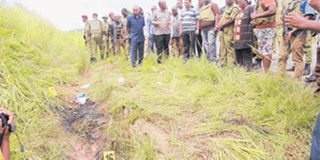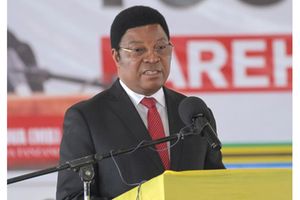What are TZ’s options for private detectives?

Home Affairs minister Mwigulu Nchemba (in striped T-shirt) with security officers at a crime scene in Kibiti District, where there was a wave of mysterious killings of local government leaders. The government dismissed calls for independent investigators arguing that local security organs have capacity. PHOTO I FILE
What you need to know:
- The government is being accused of dragging its feet probing high-profile crime cases following the shooting of Tundu Lissu, with the opposition still demanding independent probe
Dar es Salaam. Security experts and analysts say independent – and, preferably foreign – investigators are crucial in probing cases of alleged foul play involving state organs in general, and public officials in particular. This is especially the case if we are to succeed in arriving at a fair, just and correct decision in any given investigation.
Experts and analysts who spoke to The Citizen in separate interviews shared this view as pressure mounts for the government to invite foreign investigators. This is in efforts to find answers in seeking to solve some sensitive criminal incidents, which seem to trouble local/Tanzanian investigators, thereby taking unduly long to unravel and conclude.
They say the necessity for intervention by unquestionably independent forensic investigators is critical in cases where government authorities clearly lack not only impartiality, but also enough or the requisite knowledge and technological capabilities to most effectively undertake complex investigations.
But the analysts nonetheless stressed that national interests are a key factor to consider in dealing with security issues – especially when the nation considers calling in foreign investigators.
A renowned security consultant in East Africa, Dr Simiyu Werunga, said in the interview that independent investigation is strongly advised in ‘high stakes’ cases with the potential for international ramifications – and where pursuing them diligently and to their logical conclusion could have a negative impact on the country’s standing within the international comity of nations.
“Natural justice requires that, if I suspect you to be part of the problem, then I wouldn’t expect you to investigate yourself,” Dr Werunga said. This was in response to a call by the major opposition political party Chadema for ‘independent’ investigation into the criminal shooting of the party’s stalwart cadre Tundu Lissu on September 7th this year.
“The people’s representatives may, therefore, seek independent investigations on their own volition to determine the motive for the crime, and also establish who were responsible for the criminal acts,” he added.
This, Dr Werunga laid it on thick, is the route that independent, disinterested investigators would invariably take – unlike some government agencies which would probably ‘need’ to cover up for errant colleagues here and there!
There indeed are several examples of obviously criminal incidents which occurred in the country in the recent past, and have remained unsolved and unresolved for far too long.
This most unsatisfactory situation has prompted calls for investigation by experts who are not only independent and disinterested, but must be ‘seen’ by all and sundry to be so.
Some pundits – including top-notch political party leaders – have identified the US Federal Bureau of Investigation (FBI) and Britain’s New Scotland Yard as possible foreign organs that would carry out the required investigations with considerable probity and diligence.
Yet-to-be-resolved criminal incidents
Among recent cases are, the shooting in the nation’s capital Dodoma of the Singida-East Constituency Member of Parliament (Chadema) Tundu Lissu by what the authorities call ‘unknown assailants;’ the raid and bombing of two law firms in Dar es Salaam, and, much earlier, the killing of more than 30 local government leaders in Kibiti, Coastal region.
In Zanzibar, unknown assailants – commonly referred to as ‘Zombies’ by Zanzibaris – have been terrorizing people, killing some every now and then.
Prof Eginald Mihanjo, Deputy Vice-Chancellor of Eckenforde University in Tanga, is of the view that independent investigations can be conducted “anytime” – adding that this should come “when you believe that there is generalised security failure. But, you should always take into consideration your national survival and vital interests.”
Prof Mihanjo – who is apparently one of the country’s authoritative commentators on security issues – elaborated that ‘national interests’ is a key issue to seriously consider in dealing with security issues, especially when it comes to inviting foreign investigators to operate in the country.
Independent investigations
The FBI and the Scotland Yard are the two organs that immediately come to mind for most of the people who spoke in the random interview on foreign intervention.
Both organs have a history of intervention regarding investigations into selected criminal events, to which they were officially invited by the government.
Following the killing of Fr Evarist Mushi, a Roman Catholic priest in Zanzibar in February 2013, the-then Deputy Minister for Home Affairs, Mr Pereira Ame Silima, said that the two alien intelligence organs were to intervene by assisting local security organs to get to the bottom of the murder.
In the same year, two British volunteer teachers stationed in Zanzibar, Katie Gee and Kirstie Trupp, were attacked by two men on motorbikes who threw sulfuric acid in their faces. Working in close collaboration with the Tanzanian authorities, New Scotland Yard and Interpol finally arrested the crime suspects who were then dealt with in line with the country’s laws.
No foreign intervention
Reached for comment on whether or not Britain would allow Scotland Yard to intervene in the investigation of Mr Lissu’s attempted murder – as well as other ‘unresolved’ criminal incidents in Tanzania – a communications specialist with the British High Commission in Dar es Salaam, Cynthia Bavo, said: “As I am sure you are aware, UK law enforcement agencies operate internationally – but with the consent of host governments.”
However, Ms Bavo said that the UK government has not received any request from the Tanzania government for British support in this area.
The United States Embassy in Tanzania had not responded to our questions on the matter by the time we went to press.
The Tanzania Police Force spokesman, Mr Barnabas Mwakalukwa, declined to “speak on anything to do with Mr Lissu’s incident.”
Responding to the question whether or not there is a need for independent investigation, Mr Mwakalukwa said the country’s security is stable and that Tanzania has not experienced any shocking incident that would indicate to the police and the government that the Tanzanian public is in danger – and, as such, compel it to seek independent forensic assistance.
As a security consultant, Dr Simiyu Werunga – who is the founder and CEO of the East African Institute of Security Studies – is of the opinion that Tanzania’s long-reputed stability and rule of law legacy has started to come under pressure.
“The unfortunate result of this incremental breakdown of law enforcement,” Dr Werunga points out, “is the current situation where the government cannot explain to its own people the current criminal activities that are manifesting themselves all over the country.
“This is usually brought about by certain factors – the most compelling being political interference in the leadership of national security organs,” he explains.
When the political leadership in a country starts interfering in the management and operational control of its national security organs, the result is a complete erosion of professionalism and operational accountability on the part of security organs to the people they serve, he waxed professional.
“This leads to the emergence of impunity by members of the security apparatus in the country – and also the political class.”
For his part, Prof Mihanjo said that Tanzania’s security situation is deteriorating to the extent that almost each week, if not each day, there is a criminal incident.
“It’s only that we don’t check, and we don’t take precautions,” he notes. “We’re struck in the past, in a history of living in a peaceful country.”
The regional situation
Although the East African region has put in place cooperation arrangements that include forums for regional police commissioners and other interactive security and intelligence institutions, the day-to-day practical aspects of cooperation are seriously lacking.
According to Dr Werunga, “this may be due to lack of harmonized legal statutes that compel, or bring into action, structured cooperation and collaboration.
“Political goodwill from regional political leaders is a prerequisite for effective collaboration – and, therefore, if there is lack of same amongst the regional leaders, it becomes untenable to work together as a region,” he concludes.
Experts on security issues have advised the Tanzania government to come up with practical, people-centered security initiatives that allow and enable the common man (and woman) to work closely with government security organs. This would go a long way in effectuating the prevention and combating of crime in communities.




